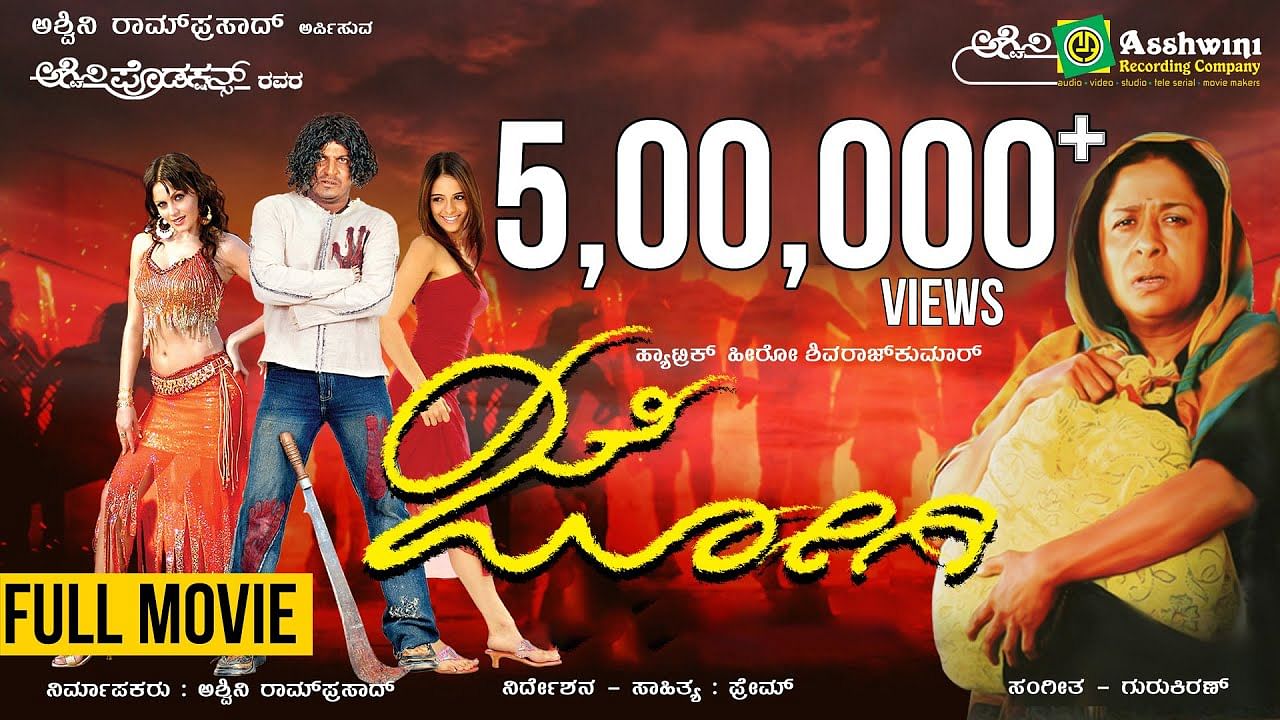It was a time when hype was created using traditional means. Films causing social-media frenzy was unheard of. Kannada film ‘Jogi’ carried unreal hype before its release in 2005. Sales of the film’s audio cassettes and CDs had gone through the roof. Rightly so, as Gurukiran’s every track was irresistible.
Kannadigas’ desperate wait for the film was understandable. Shivarajkumar, unmatched in stardom during that period, had collaborated with Prem, a director with the golden touch. Prem was in quest of the most sought after tag of ‘hat-trick director’ following two blockbusters. And here he was, working with the ‘hat-trick hero’ himself.
However, it was the film’s another big name that made people curious and excited in equal measure. What was Arundathi Nag doing in the film? Arundathi, the theatre stalwart, personality who founded the renowned Rangashankara and wife of Kannada Film Industry’s visionary Shankar Nag, was only seen in handful of films. She performed in quality works that were made for reasons beyond their commercial value.
How did a performer known for classy works collaborate with a film-maker who had grown into a darling of the masses? Perhaps she wanted to break out and try something new. In ‘Ondu Muttina Kathe’ (1987), Shankar directed the legendary Rajkumar. Close to two decades later, the two families had raised hopes of something special again. For Kannada film lovers, this was stuff of dreams.
‘Jogi’ did justice to its massive build-up and shattered industry records. Today, the film is remembered for rebirthing the underworld genre. The film’s premise of an innocent adult drawn into rowdyism attracted filmmakers. Most of them failed to recreate the magic of ‘Jogi’, throwing KFI into a content crisis.
In my view, the rowdiysm portions of the story lacked depth. Prem was more concerned in writing interesting names for his characters. Scenes involving them were shallow and repetitive. ‘Jogi’, for me, succeeded in evoking a heart-rending experience through its mother-son relationship. For this reason, the film makes for a perfect watch on Mother’s Day.
Prem’s go-for-broke filmmaking was admirable. Be it the gripping night sequences, stylish fights and stunningly shot songs, the film had all. Amid this, full marks to Prem for not compromising on the emotional quotient. The mother sentiment is the backbone of this ambitious film.
The dynamics of the mother-son relationship is seen through the lens of innocence and that is not a bad ploy, considering the characters hail from a rural background. Prem uses dance as a tool to show the strong bond. Madesha (Shivrajkumar) loves dancing (folk) and his best partner in this is none other than his mother.
Just a single scene of the mother-son duo dancing in the first half succeeds in establishing the unconditional love they have for each other. It’s amusing how it is achieved. Top-notch acting, staging of the scene and the terrific background score beautifully translates the idea from paper to screen.
Prem is really focused in his intentions. He could have opted for a more holistic approach and used the theme of parents’ love. Instead, ‘Jogi’ is unabashed in its belief in the mother sentiment angle. See how hurt and angry Madesha is when his mother’s bangles are broken as part of the Hindu tradition after his father’s death. The fact of losing his father is overshadowed by the resolve to buy golden bangles for his mother.
Later on, as they desperately try to find each other in the big, bad city of Bengaluru (Bangalore then), the film manages to showcase the special and overwhelming nature of the relationship.
Prem’s writing, which mostly meanders, shines brightest whenever he sneaks in this mother-son relationship in the thick macho arena of the film. Madesha, who comes to Bengaluru in pursuit of the precious gift for his mother, unfortunately lands up in jail. To complete the circle, circumstances throws him in prison again, this time on the day he is ready to reunite with his mother.
As the story reaches crescendo, ‘Jogi’ tries to manipulate the audience, who cannot help but surrender to the film’s journey. The duo’s near misses set us up nicely for the climax. The long final act is the film's cornerstone. There is another writing gem. We witness the final dance. During Madesha’s funeral dance, it aches your heart to see the still, dead body of his mother, who, given a chance, would have jumped to shake a leg with her son. The irony hits your gut.
Shivarajkumar acts out of his skin. You tear-up watching him express a range of emotions when he learns about his mother’s death. For Arundathi, it is a role perfect to her abilities. The duo’s performance reaches straight to your heart. They show the importance of chemistry and how it need not be restricted to the hero-heroine characters.
Today, Prem has lost the enormous trust from his audience. His ridiculous obsession with the mother sentiment concept – witnessed in all of his four films post ‘Jogi’ – was mocked by the audience. His craft too has taken a beating. Perhaps that is how you separate the men from the boys. Great filmmakers evolve with success and have the knack to comeback after a debacle.
Notwithstanding, the director and his team deserve immense praise to pull of a magnum opus in fine fashion. For the names involved, efforts put in and results achieved, ‘Jogi’ definitely deserves a place in the list of good Indian films with mother sentiment.
After every viewing, ‘Jogi’ leaves you shaken. The tragedy haunts you. You forgive the film’s inconsistencies and flaws and keep going back to it. The biggest draw for fans is the beautifully portrayed relationship. The line from the film's final song 'Beduvanu Varavanu', is the perfect message to celebrate Mother's Day. It says: 'Thaayi Ne Ella, Badalagodilla' (A mother is everything and it will never change).
